It has been a year of navigating the new normal on many fronts. Enrollment remained down at every level from community colleges to graduate schools, but much of academia showed its persistence and resilience.
With the COVID-19 pandemic subsiding, colleges and universities have tried to bring students back to campus and provide fresh inspiration. Although the Omicron variant upended plans much of the winter, by spring, things had settled down. And since then, most faculty members and students have been thriving with either a hybrid model or in-person classes.
Biden Administration
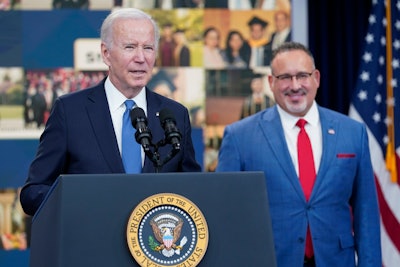 U.S. President Joe Biden, left, is flanked by Secretary of Education Dr. Miguel A. Cardona.
U.S. President Joe Biden, left, is flanked by Secretary of Education Dr. Miguel A. Cardona.
“Using the authority Congress granted to the Department of Education, we will forgive $10,000 in outstanding student federal loans. In addition, students who come from low-income families, which allowed them to qualify to receive a Pell Grant, will have debt reduced $20,000,” Biden said in August.
To qualify, individuals must earn less than $125,000 a year and families must earn less than $250,000 so that high-income individuals and households cannot benefit. The Biden-Harris administration anticipated that the debt forgiveness would impact 95% of student loan borrowers, or about 43 million people.
The debt forgiveness has faced legal challenges, including from six Republican-led states that accused the president of overstepping his power. The Eighth U.S. Circuit Court of Appeals has issued a stay while it considers the legal challenges to the debt forgiveness program.
U.S. Secretary of Education Dr. Miguel A. Cardona granted Diverse: Issues In Higher Education an interview to discuss his first year in the position and what he sees as the biggest challenges and accomplishments of the U.S. Department of Education (ED). Cardona spoke about the American Rescue Plan (ARP), which included the Higher Education Emergency Relief Fund III that supported higher education institutions and enabled them to serve students during the pandemic.
In January 2022, an additional $198 million in ARP funds went to support primarily community colleges and other high-need institutions so they could address students’ basic needs. Additionally, the Pell Grant maximum increased from $6,495 to $6,895 for the 2022-23 academic year.
Supreme Court News
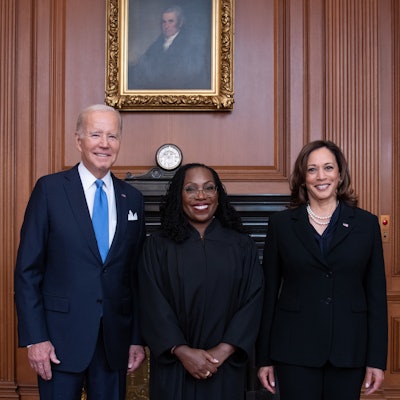 U.S. Supreme Court Justice Ketanji Brown Jackson poses between President Joe Biden and Vice President Kamala Harris.
U.S. Supreme Court Justice Ketanji Brown Jackson poses between President Joe Biden and Vice President Kamala Harris.
“Seeing a Black woman represented on the highest court of the land is inspirational and provides a path to strive for — not only for Black women who are aspiring law students, but Black women lawyers interested in careers in the judiciary,” says attorney Paula T. Edgar, a DEI and EEO consultant, trainer, and facilitator. “As Black women lawyers, we celebrate her appointment with joy, while reflecting on the sobering experience it was for her to reach this height.”
On June 24, the Supreme Court overturned Roe v. Wade, a landmark decision in which the Court ruled that the Constitution of the U.S. conferred the right to have an abortion. Diverse reached out to 29 women’s colleges or historically women’s colleges.
In a statement sent to the campus community of Meredith College in Raleigh, N.C., Dr. Jo Allen, Meredith’s president, wrote, “A ruling that defies a woman’s intellect and right to determine what happens to her own body not only delves blatantly into a woman’s privacy but also signals disrespect for her decision-making and careful weighing of all sides of that decision.”
In July, Tribal Colleges and Universities, which was established in 1968, affirmed its mission to sustain and educate on issues of tribal sovereignty, the ability of each tribal nation to govern and represent itself. This came in response to the Supreme Court ruling in Oklahoma v. Castro-Huerta in June; Justice Brett Kavanaugh wrote in his decision, “As a matter of state sovereignty, a State has jurisdiction over all its territory, including Indian country.”
“This adds another layer of complexity to those already complex jurisdictional questions and prosecutions, and really has the potential to further disconnect the exercise of criminal justice from the people in the community and the government in the community that is closest to the effects of those criminal actions,” says Monte Mills, the Charles I. Stone Professor of Law and director of the University of Washington School of Law’s Native American Law Center.
In October, the Supreme Court heard oral arguments in two cases that will impact the future of race-based affirmative action programs in America. The Supreme Court is not expected to release a ruling until the end of its term in June.
Passing of Diverse Co-Founder
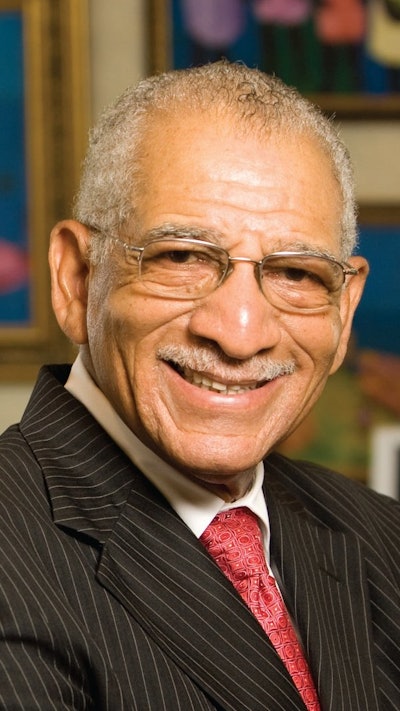 Dr. William E. Cox
Dr. William E. Cox
“Before the founding of Black Issues In Higher Education, there was a deafening silence on issues related to Blacks and other minoritized groups in the academy,” says Dr. Charlie Nelms, chancellor emeritus of North Carolina Central University. “With the founding of Diverse by Bill Cox and Frank Matthews, all of that changed.”
“We started Black Issues In Higher Education simply because there was a void in the higher education community. The only one out there in higher education at that time was Chronicle of Higher Education,” Cox said in a 2019 interview. “We attempted to do something for Black faculty and administrators and so Black Issues was started. When we started in 1984, we were only coming out once a month. And I told Frank that in order to attract advertisers, we needed to be more frequent and so we started to come out twice monthly, after two years.”
It was that kind of business prowess that Matthews always admired about Cox.
“We found that business and education can complement each other very well,” says Matthews. “Bill was unmitigated in his passion for the power of education.”
Diverse Champions Award
Dr. Eboni M. Zamani-Gallaher, a renowned community college leadership scholar, was the 2022 recipient of the Diverse Champions Award. She is currently a professor of higher education and community college leadership and director of the Office for Community College Research and Leadership at the University of Illinois at Urbana-Champaign as well as executive director of the Council for the Study of Community Colleges.
Title IX Anniversary
Title IX, the 37 words that prohibited discrimination based on sex at any education program or activity that receives federal financial assistance, marked its 50th anniversary in June. The NCAA issued a report, “The State of Women in College Sports,” to illustrate the participation gains for female student-athletes as well as the ongoing inequalities.
Only two other Black women are athletic directors at Power 5 institutions, says University of Virginia Athletic Director Carla Williams at the Title IX panel of Sports Business Journal’s Game Changers conference in October. It demonstrates that progress is slow given the number of qualified candidates. Williams became the first African American female AD at a Power 5 conference school in 2017.
Good news came from Dawn Staley, who in April coached the University of South Carolina to its second NCAA Division I Women’s Basketball Championship. Staley now has a historic seven-year, $22.4 million contract. During her appearance on “The Daily Show with Trevor Noah,” Staley said she was already generously compensated, but she wanted to set a precedent. “It wasn’t really for me,” she says. “It was more for other coaches.”
2022 Arthur Ashe Jr. Sports Scholars of the Year
In the spring, Diverse named Nakobe Dean and Sophie Jaques the Male and Female Arthur Ashe Jr. Sports Scholars of the Year respectively. Then a linebacker at the University of Georgia, Dean is now playing professionally in the NFL with the Philadelphia Eagles. Jaques, an ice hockey defenseman, is using her additional year of NCAA eligibility to play this season while pursuing graduate studies at The Ohio State University.
HBCUs
In March, U.S. Vice President Kamala Harris, U.S. Attorney General Merrick Garland, U.S. Deputy Secretary of Homeland Security John Tien and Cardona announced grant funding available for eligible HBCUs that have received bomb threats. According to the FBI under the U.S. Department of Justice, in the first three months of the year, more than 80 anonymous bomb threats were made against HBCUs, places of worship and other faith-based academic institutions.
“It is our duty to do everything we can to protect our communities. A harm against any one of our communities is a harm against all of us,” says Harris, a graduate of Howard University.
There was also positive news as HBCUs continue to increase their impact. Earlier this year, HBCUs were presented with an exciting opportunity as the United States Air Force announced its intention to establish a University Affiliated Research Center (UARC) at one of the 11 HBCUs that have Carnegie Classification Research 2 status. Whatever institution receives the UARC, which will research tactical autonomy, will likely bring other HBCU institutions, not only other R2s, into the project, bringing about a positive impact for all involved.
“It is opportune that HBCUs are being heralded as prestigious institutions of higher education, but we must not allow this moment to be fleeting,” says Guttman Community College (CUNY) President Dr. Larry Johnson Jr., who earned his undergraduate and graduate degrees at HBCU institutions. “It is the HBCU experience that taught me the importance of being unapologetic and unabashed about my personal and professional aspirations.”
Headline News
One year after the Jan. 6, 2021, attack on the U.S. Capitol, higher education professionals were still working to silence “The Big Lie” that the 2020 Presidential election had been manipulated in favor of Biden’s victory. That remains a challenge. On Election Day 2022 multiple candidates were election deniers.
In the fall, Hurricanes Fiona and Ian pummeled Florida and Puerto Rico. Dr. Lawrence Drake II, president of Bethune-Cookman University, an HBCU in Florida, said his campus and town had never previously experienced a weather event like Ian. After mandatory evacuations, there was a staggered student return to campus in October and November. There are ongoing concerns about extreme weather events, especially at colleges and universities that serve majority minoritized populations.
Last May, schools officially and unofficially noted the two-year anniversary of the murder of George Floyd by a Minneapolis police officer. Metropolitan State University in St. Paul, 10 miles from the location of Floyd’s death, issued a statement inviting students to participate in the nearby George Floyd Global Memorial. Oregon State University marked the anniversary by hosting its inaugural State of Black Affairs Summit organized by the President’s Commission on the Status of Black Faculty and Staff Affairs, which was formed in the wake of Floyd’s murder.
As of April, Morris Brown College, a private HBCU institution in Atlanta, was fully reaccredited after 20 years. Being unaccredited meant students could not access Title IV federal student aid, and the college did not receive any ARP funds. “History will say we pulled ourselves up by our bootstraps,” says Dr. Kevin James, Morris Brown’s president.
Notable Appointments
In April, Dr. Helene D. Gayle, a physician and public health leader, was named the 11th president of Spelman College, a historically Black women’s college. “This is a moment where HBCUs are once again being recognized for the importance that they bring to every sector of this country,” said Gayle in a statement.
As an undergraduate, Gayle attended Barnard College, the women’s undergraduate college of Columbia University. In July, Barnard’s president Dr. Sian Leah Beilock announced that the 2022-23 academic year would be her last at the college. Beilock will become the first female president of Dartmouth College, another Ivy League institution.
Retired three-star U.S. Army General Darrell K. Williams was named president of Hampton University, an HBCU in Virginia. Williams, a Hampton graduate, served as an executive for a global technology company following his retirement from the Army in 2020.
Dr. Valerie Ashby assumed the presidency of University of Maryland, Baltimore County (UMBC), which recently received Research 1 classification. Ashby also oversees bwtech@UMBC Research and Technology Park, which bolsters economic development via government and industry partnerships, and promotes entrepreneurship, workforce training and technology commercialization programs.
Dr. Dietra Trent, a Hampton alumna, was appointed executive director of the White House Initiative on Advanced Educational Equity, Excellence and Economic Opportunity through Historically Black Colleges and Universities. Dr. Jerlando F. L. Jackson, a prolific educational researcher, is the new dean of Michigan State University’s College of Education. He is the first African American to hold the position at MSU. He also holds the position of MSU Foundation Professor of Education.
Retirements
Acclaimed poet Nikki Giovanni retired on Sept. 1, after 35 years on the faculty of Virginia Tech. Giovanni has received 30 honorary degrees and seven NAACP Image Awards. Her latest illustrated children’s book, A Library, debuted this fall at the Library of Congress. It recounts her weekly visits to a segregated library during her childhood.
History-maker Dr. Ruth J. Simmons, the first Black president of an Ivy League institution, Brown University, which she led from 2001-12, retired as president of Prairie View A&M University after five years. When she assumed the presidency of Prairie View in 2017, she thought her stay would be brief, but she was determined to address issues that the university faced, including financial support for students and financial security of the university. Simmons vowed to continue supporting that work.
Dr. William R. Harvey, president of Hampton University, retired in June after 43 years at the helm of Hampton. Harvey holds degrees from Talladega College, Virginia State University, and Harvard University. During his tenure, Harvey led the initiation of 92 new academic degrees — 12 new doctoral programs — the building of 29 buildings and the launch of four satellites. He also increased SAT scores by more than 300 points and the endowment from $29 million to $300 million.
In Memoriam
The year began with the passing of a pivotal figure, Lani Guinier, one of the nation’s foremost legal scholars on race and civil rights, who died in January at the age of 71. She was a renowned educator, scholar, and civil rights lawyer whose research focused on voting rights.
“Her scholarship changed our understanding of democracy — of why and how the voices of the historically underrepresented must be heard and what it takes to have a meaningful right to vote,” John F. Manning, the Morgan and Helen Chu dean and professor of law at Harvard Law School, told Harvard Law Bulletin.
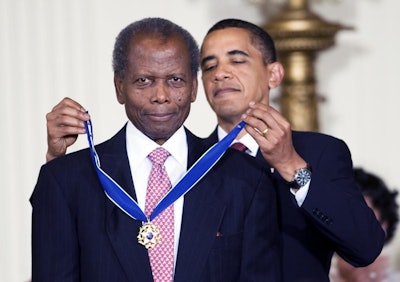 Sidney Poitier
Sidney Poitier
Poitier, a fierce advocate for education, became the first Black actor to win an Academy Award for best lead performance in “Lilies of the Field” and the first to be a top box-office draw. The son of tomato Bahamian farmers on Cat Island, Poitier was the youngest of nine children. He moved to Miami to live with a brother when he was 14, then a year later to New York City, where he started his acting career.
Valerie Boyd — a well-known journalist, biographer, and professor at the University of Georgia — died in February. She was 58 years old.
The author of Wrapped in Rainbows: The Life of Zora Neale Hurston, Boyd was an associate professor of journalism and the Charlayne Hunter-Gault Distinguished Writer in Residence at the Grady College of Journalism and Mass Communication at the University of Georgia.
Dr. Autherine Lucy Foster, the first Black student to attend the University of Alabama, namesake of the Autherine Lucy Hall on campus, died in March. She was 92 years old.
Lucy Foster came to the University of Alabama to earn her master’s degree in education in 1956. But just three days after Lucy Foster enrolled, the University expelled her for her safety. She was able to return to and complete the program in 1991. In 2019, the university gave her an honorary doctorate.
Dr. Thomas W. Cole Jr., former president of Historically Black Colleges and Universities (HBCUs) West Virginia State University (WVSU) and Clark Atlanta University (CAU), died in April. He was 81 years old.
Cole was the eighth leader of WVSU, serving from1982 to 1986. While there, he created new academic division and built WVSU’s planning and advancement unit.
“Dr. Cole was a true leader in higher education and left a lasting legacy at a number of institutions, including West Virginia State University that has impacted generations of students,” said current WVSU President Ericke Cage.
Dr. Lillian Lowery, who ran public schools in Maryland, Delaware and Virginia, ultimately spearheading new national curriculum standards and reforms to student discipline policies, also died in April. She was 67.
“Her passion for the education and equity of all students was unmatched,” wrote Dr. Miguel Cardona, the U.S. secretary of education, on Twitter. “She was a giant in our field, and she will be missed.”
A native of Gastonia, North Carolina, Lowery was among the first students to integrate North Carolina schools. After a distinguished career as a teacher and administrator, Lowery joined The Education Trust and later the Educational Testing Service (ETS) as vice president of student and teacher assessments in 2018. She retired from ETS in February 2022.
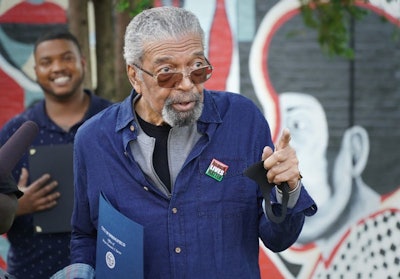 Nelson Lowell Stevens Jr.
Nelson Lowell Stevens Jr.
Stevens was celebrated for his focus on African American culture, particularly jazz. From 1962 to 1966, he was an art instructor in the Cleveland Public Schools, and during that time regularly went to the Jazz Temple where he heard famous musicians such as John Coltrane. Over the years, he developed close friendships with musicians Max Roach and Archie Shepp, who were also on the faculty at UMass.
Dr. James Turner, a pioneer in the field of Black studies and the founding director of the Africana Studies and Research Center at Cornell University, died in August. In many ways, Cornell is considered the birthplace of Africana studies, a term Turner coined to conceptualize the comprehensive studies of the African diaspora and describe the multidisciplinary analysis of the lives and thoughts of people of African ancestry throughout the world.
“James Turner gave his life and academic career to uplift our people. His character, sacrifice and steady hand in apprenticing us for liberation intellectual work remains the model of Black/Africana Studies,” said Dr. Greg Carr, an associate professor of Afro-American studies at Howard University.
Rev. Dr. Calvin O. Butts III, who served as senior pastor of the Abyssinian Baptist Church and was one of New York City’s most influential religious and community leaders, passed away in October at the age of 73. Butts was also the former president of the State University of New York (SUNY) College at Old Westbury from 1999 until his retirement in 2020.
“I had the pleasure of engaging with Dr. Butts a few times since my arrival on campus,” said Dr. Timothy E. Sams, who succeeded Butts when he assumed the presidency of SUNY Old Westbury in January. “I was, and always will remain, impressed not only by his love for this institution and its people, but for his belief in the powerful role SUNY Old Westbury must play in providing access to a high-quality education and for its historic commitment to social justice.”
This article appeared in the December 8, 2022 edition of Diverse.





















